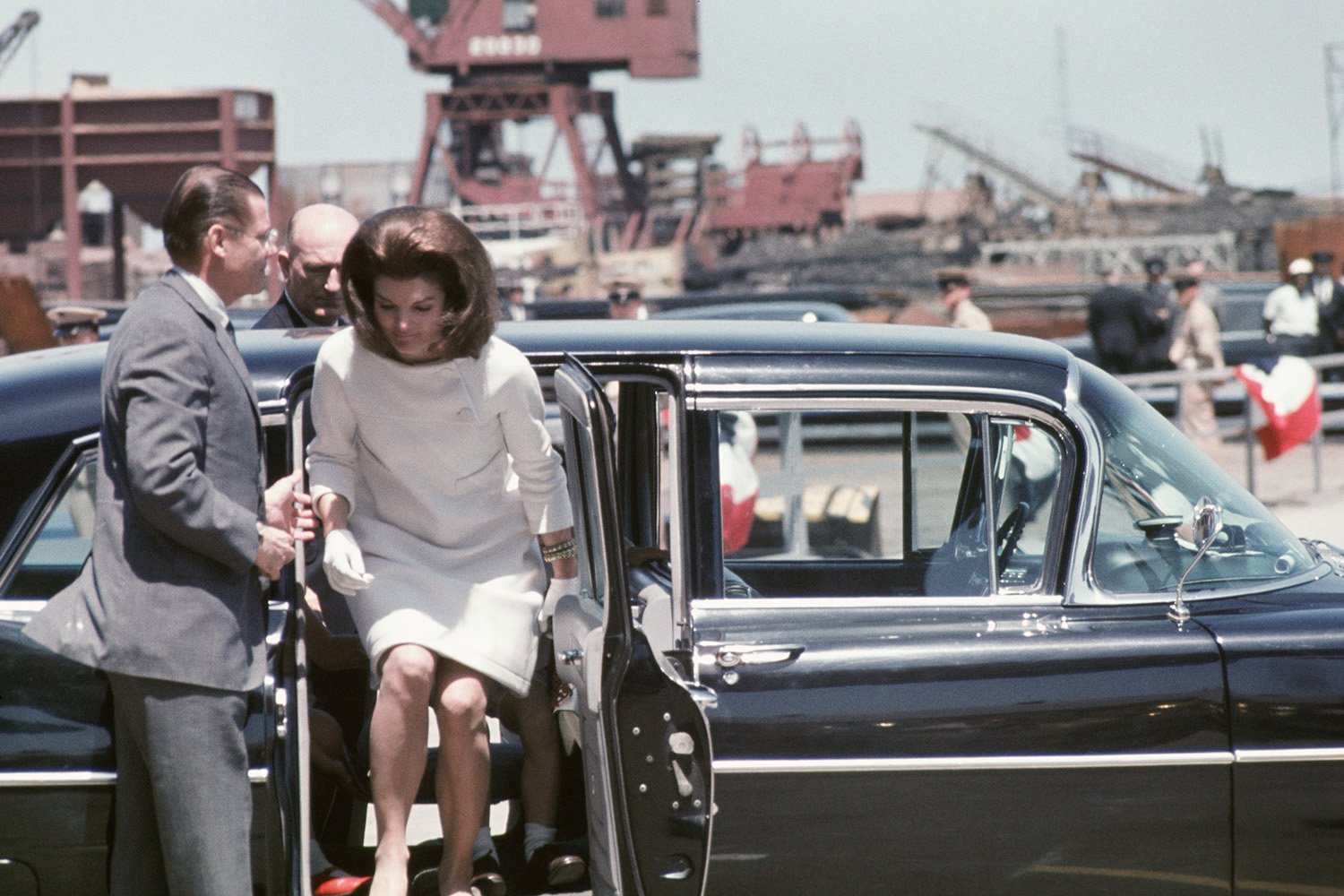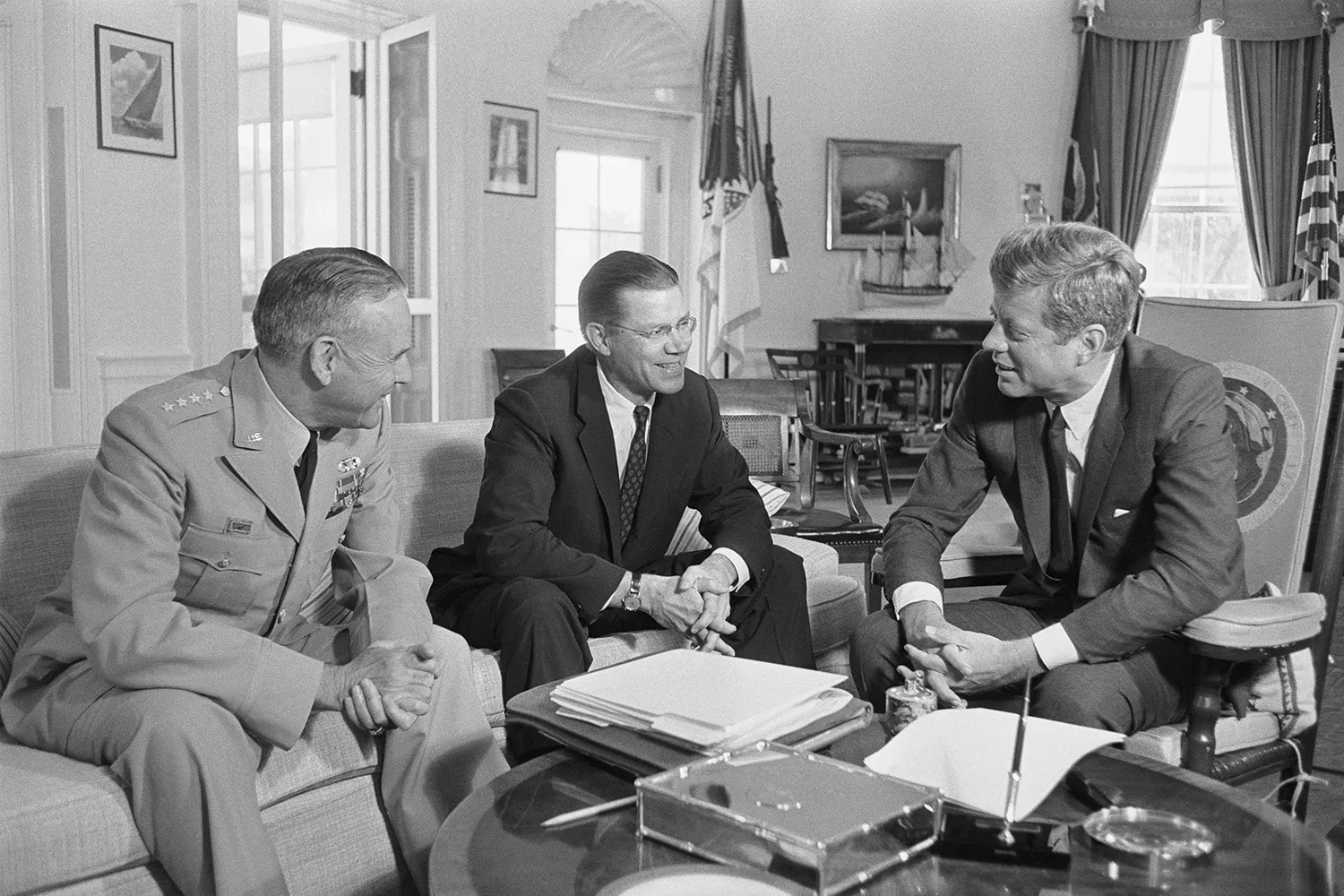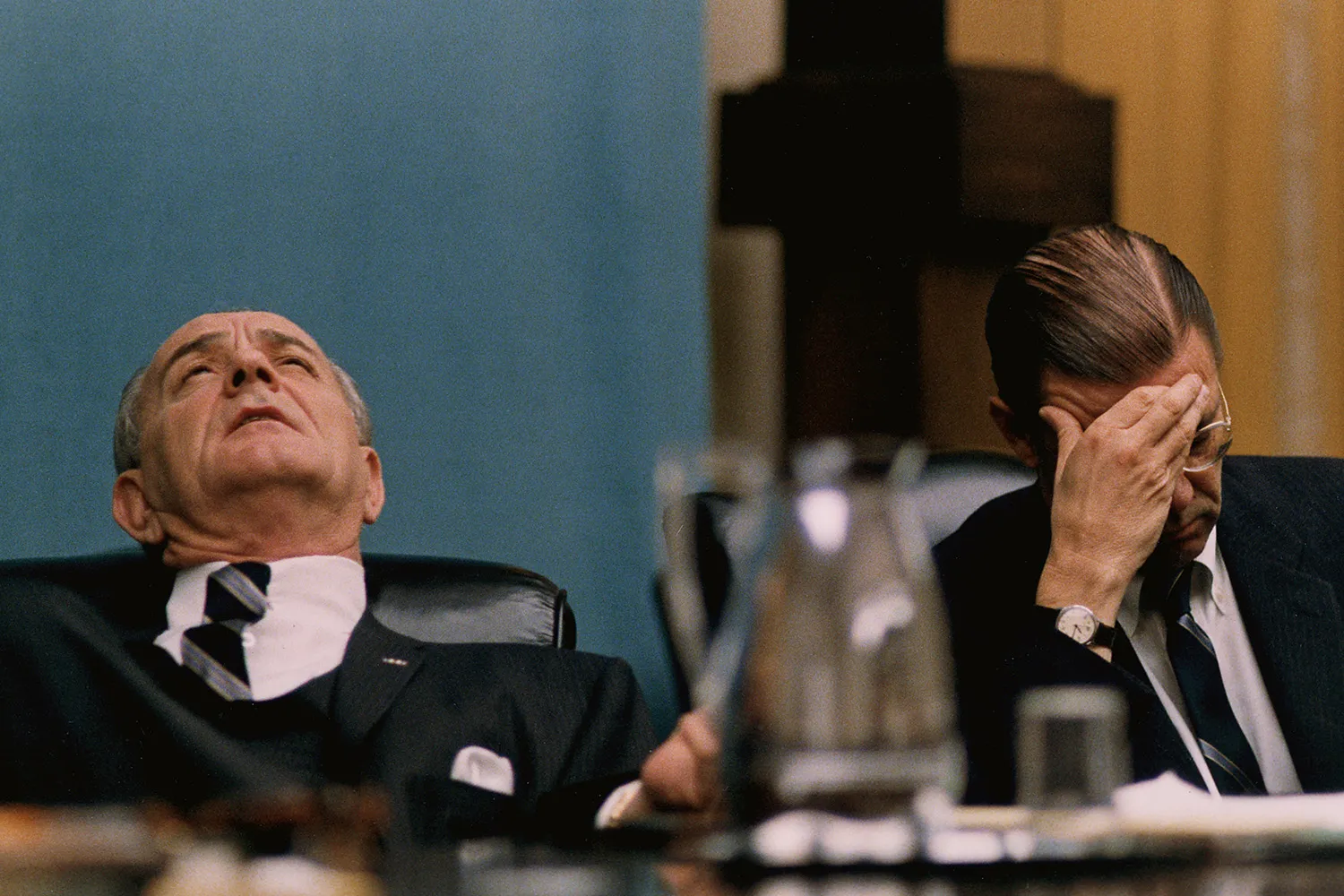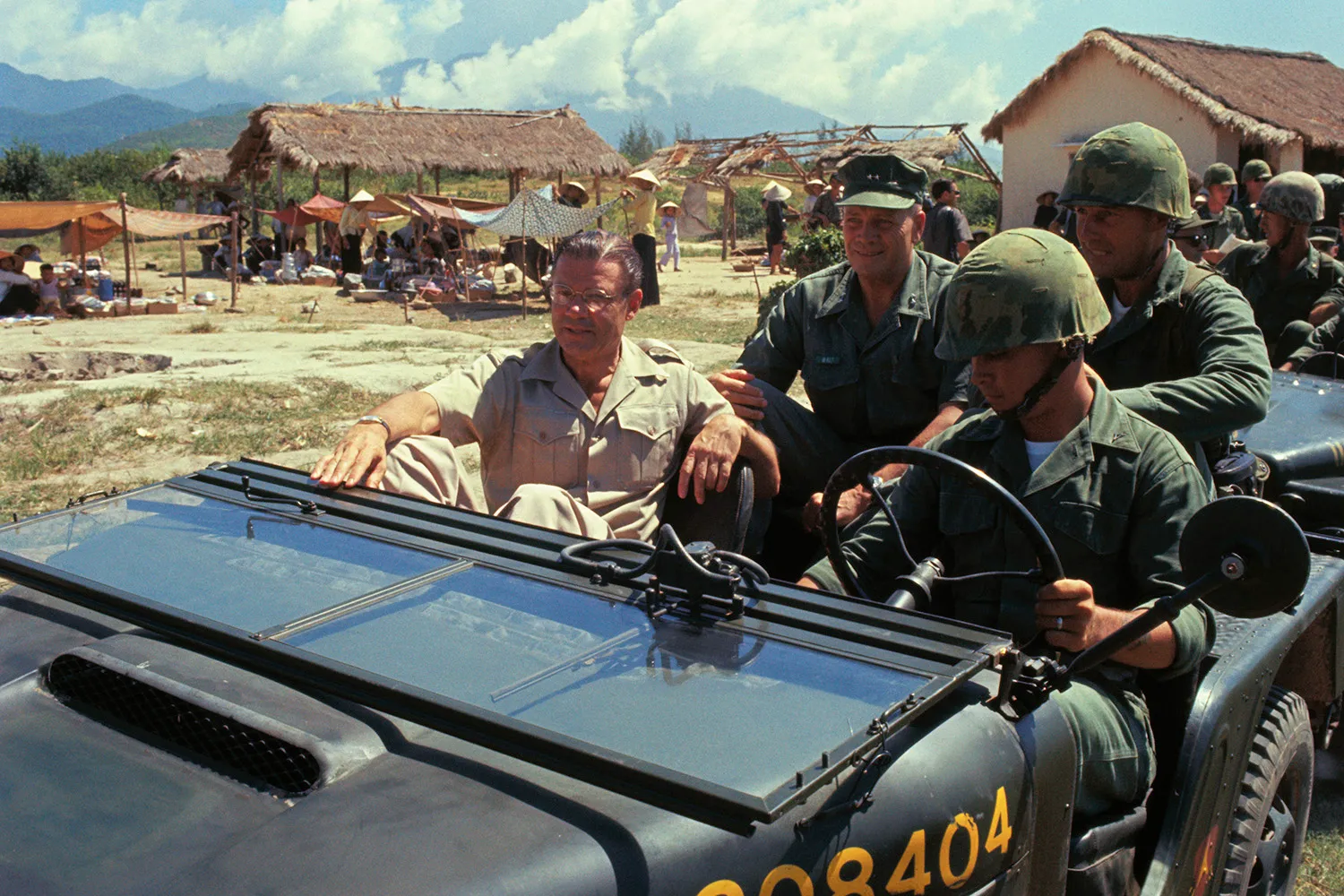The life of Robert McNamara, the secretary of defense under Presidents John F. Kennedy and Lyndon Johnson, is an American tragedy. The history is not only tragic—as Pulitzer Prize winner William Taubman and his brother, former New York Times Washington bureau chief Philip Taubman, explain in their fascinating new book McNamara at War—because McNamara ended up isolated, detested, and in fraught relationships with his children. It is also because McNamara knew from the start of his tenure as secretary that the war in Vietnam was unwinnable.
Even as anti-war protesters publicly attacked him in the mid-1960s for being the architect of the quagmire in Southeast Asia, McNamara was pumping out confidential memos and engaging in private conversations admitting that the operation was essentially futile. Every cabinet member who realizes that the president they work for is doing something that is fundamentally dangerous to the country confronts a critical choice: whether to stay in the administration to work from the inside or to try reversing the damage by resigning in protest and mobilizing as an opponent of the president.
Until late 1967, McNamara decided to remain in the inner halls of power. His definition of “loyalty” meant being loyal to the president above everything else. McNamara repeatedly supported demands from Gen. William Westmoreland to call up more troops to Vietnam to bolster the president’s war and administration requests for more money from Congress to pay for the troops and bombs. He consistently informed the press that the war was progressing well and that the United States was advancing toward victory. He publicly rebutted critics with whom he privately agreed. In other words, McNamara became a shield for Johnson as the administration kept defending a war that resulted in tens of thousands of Americans coming home in body bags. The war left a nation once proud of having defeated fascism in Europe and Japan in World War II bitterly divided and disillusioned. As Johnson deployed counterintelligence to discredit protesters as anti-patriotic and communists, McNamara secretly understood they were on the right side of history.

The Taubmans tell a riveting tale. Their book draws on newly unearthed primary documents, including Jacqueline Kennedy’s private letters to McNamara and a secret diary of his top aide, John McNaughton, an assistant secretary of defense. This biography moves the reader through McNamara’s difficult upbringing, particularly the influence of an overbearing mother (who “hovered over him like a helicopter parent in a pre-helicopter age, smothering him with attention and instruction while pushing him relentlessly to greater heights”). Before his teenage years, McNamara’s family moved to a neighborhood in Oakland, California, which allowed him to go to school in the much wealthier East Bay hills. He was a brilliant student at Piedmont High School, which he graduated from in 1933. Because his father couldn’t afford tuition at Stanford University, he attended University of California at Berkeley, where he served as a ROTC cadet and majored in economics.
There was a softer side to McNamara, we learn from the authors, as he developed a keen appreciation for poetry. His friends considered him to be congenial and principled. He had some trouble fitting into the raucous Phi Gamma Delta fraternity, where he invited faculty to speak to his hard-drinking friends to elevate the intellectual atmosphere of the house.
At Harvard Business School, McNamara developed a passion for quantitative analysis and accounting methods. He earned his MBA in 1939 before taking a job at Price Waterhouse in San Francisco. He returned to HBS to take a position as assistant professor. He married his college classmate, Margaret “Margy” Craig. In 1943, McNamara enlisted in the Air Force, where he worked for much of his service on statistical control systems. As was the case for many Americans of his generation, the Japanese attack on Pearl Harbor sounded a clarion call to serve his nation.
During the war, McNamara applied his methodological skills to military force by helping the soldiers under the control of General Curtis LeMay be even more precise and lethal in their airstrikes. His work helped LeMay conduct the extraordinarily devastating firebombing of Tokyo.
McNamara’s return to the home front was marred when he and Margy contracted polio. His case was mild; his wife suffered much more. The cost of her recovery was part of the reason he hesitantly left academia to accept an executive position at the Ford Motor Company. Though he shifted career paths, McNamara continued to excel. He focused on initiatives such as better safety and producing cheaper cars, while working to improve the problematic internal organization of the company as it transitioned from producing bombers back to making cars.
His pace of work could be brutal. McNamara was gruff with colleagues and others whom he didn’t respect (such as car dealers). In the corporate offices, McNamara revealed his unyielding stubbornness when it came to following through on a plan. “Bob hated to change the course of action after he got going on something,” one colleague recalled. Flexibility, even after realizing that he was pursuing a problematic decision, was not his strong suit.

The heart of the book centers on his time in the White House. The relationship McNamara had with Kennedy—a Harvard man—was strong. Kennedy deeply respected McNamara’s ability to handle complex administrative and decision-making challenges, which were important as he navigated through dangerous situations such as the Cuban missile crisis in 1962. McNamara also helped developed the “flexible response” strategy, which relied more on conventional weapons than on missiles.
It was during these years that McNamara developed an oddly intimate relationship with First Lady Jaqueline Kennedy. The two exchanged many handwritten notes and letters and even shared a Valentine’s Day cards in 1963. Without much evidence, the authors speculate that the first lady sought refuge from her husband’s sexual exploits; McNamara, they believe, was taken by the attention of this beautiful and charismatic woman. McNamara, the authors add, remained deeply in love with his wife.
By the time of Kennedy’s assassination in November 1963, McNamara sensed that the United States needed to get out of Vietnam as soon as possible since the south was growing unstable.

But with Johnson in the Oval Office, the secretary faced a very different kind of boss. McNamara struggled to deal with the manic and depressive personality of Johnson, who could close down or lash out at any given moment. Johnson refused to listen to the warnings of anyone in his inner circle. Loyal to the president and fearful of being marginalized for expressing his concerns (as Vice President Hubert Humphrey had been), McNamara stuck with the party line. McNamara lashed out against intellectual skeptics, activists, journalists, and critics within the administration. In the book’s most devastating chapter, “Turning Points,” the authors show how, at key escalatory points in 1964 and 1965, McNamara stood right behind the president. Both McNamara and Johnson were “wrestling with their own internal demons,” yet they both kept saying yes to more.
The secretary’s loyalty took an enormous toll, and he knew it. By the end of 1965, McNamara was so distraught about what he was doing that he teared up during a conversation about the war with an acquaintance, and spoke openly to the historian Arthur Schlesinger Jr. at a party about what was going so wrong. Though the book is thin on the domestic political history of the Vietnam War, which loomed large over the pressures that motivated Johnson and other cabinet officials, there is still more than enough material to convey how little room the president felt he had to turn back without destroying his chances for reelection.
Despite his doubts, despite the information available to him, and despite his private statements, McNamara spent most of 1966 protecting his boss and defending an operation that sent thousands of U.S. troops to their deaths. In those moments when McNamara tepidly attempted to take a more assertive stand, Johnson continually overruled or out-maneuvered him. (For example, when McNamara’s daughter Margaret married in September 1966, Johnson and the first lady attended. Johnson knew that doing so would connect them in the public eye as allies.) When the year ended, many anti-war activists were railing as much against “McNamara’s War” as “Johnson’s War.” Both were architects to the disaster. When McNamara went to Harvard for a candid off-the-record conversation with students and faculty, he was greeted by hundreds of furious students who surrounded his car. The police had to help him escape.
In the end, McNamara never did anything about what he knew. At every point, the possibility of truly breaking with Johnson fell apart. McNamara worked with McNaughton on a negotiation plan and became increasingly vocal, in public and private, about his concerns. Yet the negotiation plan fizzled when McNaughton passed away in July 1967. The closest McNamara came to saying in public was at a speech on May 18, 1966, in Montreal to the American Society of Newspaper Editors, where he rejected the notion that military defense was the first tool of U.S. foreign policy. More revealing was how unsettled top Pentagon officials like Daniel Ellsberg were seeing the huge distance between what McNamara was generally saying in public and what he was saying and feeling in private. When Johnson sensed that McNamara might finally say something bolder, Johnson made an exit plan to get rid of him.
McNamara accepted a job as president of the World Bank in November 1967, when the war was in full swing. He rejected Sen. Robert Kennedy’s suggestion to resign in protest to help bolster the antiwar movement. Instead, it took him decades before offering a public accounting of what he had known from early on. When McNamara finally admitted what he had done wrong, much of the U.S. public had little interest in hearing what he had to say. It was too little and much too late.

The authors attempt to provide more humanity to McNamara. In their account, he was a person who could exhibit sympathy and warmth. The war personally tortured him, in contrast to the maniacal image protesters had of him, and he could exhibit empathy toward those who were suffering.
Nonetheless, the fact that he was human does little to wipe away the enormous culpability of what he did and the consequences of his decision to stay silent when it mattered. To all the Americans who lost their lives and family members, and to a nation that lost its way, the extra complexity doesn’t change the big picture.
It is difficult to finish reading this book feeling much sympathy for McNamara. The title—McNamara at War—remains accurate, though of course it was Johnson who bore the greatest responsibility. The book paints the picture of an extraordinarily talented individual who knew that the president he worked for was engaged in a breathtakingly destructive war. As a result, the book is a case study of how high-ranking officials who don’t act on the information they have live with the illusory notion that their being on the inside is somehow better for the nation in the long run.
In 2025, this book should be required reading for everyone working in silence in Washington.
The post Robert McNamara Chose Loyalty to the President appeared first on Foreign Policy.





